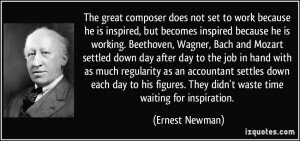 Where does inspiration come from, the spark to create?
Where does inspiration come from, the spark to create?
….even fairly mundane activities can feed in to the discovery of new insight, new knowledge and new means of expressing ideas in all sorts of ways
– Professor John Rink
It may surprise you to learn that creativity tends to spring from routine, from the mundane. “Light-bulb” moments are rare, and sitting around waiting for the fickle muse to strike is largely wasted time. The personal routines of creative people may be wildly eccentric or incredibly precise, but the common thread is the routine, and the dedication to commit to practising your craft or art on a regular basis.
Forget the idea that inspiration will come to you like a flash of lightning. It’s much more about hard graft……Routine is really important. However late you went to bed the night before, or however much you had to drink, get up at the same time each day and get on with it.
– Mark-Anthony Turnage, composer
Mark-Anthony Turnage – Riffs and Refrains II: Arioso
The boundaries of a daily routine give the mind the chance to wander freely, to the extent that ideas may come at unexpected moments while one is engaged in mundane activities, such as doing the dishes or having a shower. By rendering aspects of daily life automatic and routine, we can “free our minds to advance to really interesting fields of action” (William James, psychologist). The self-discipline of a daily routine brings comfort and a kind of personal meditation or flow state which allows creativity to flourish. Routine also allows us to plan our work schedule and any deadlines which need to be met, which means we can be more realistic in estimating how much time we have to a piece of music ready for a concert, for example. If this all sounds far too regimented, it’s worth noting that a well-organised schedule, means one actually has the time to “go with the flow”, to fit in unexpected, spontaneous or last-minute events and activities, and it can also help avoid procrastination.
Be regular and orderly in your life, so that you may be violent and original in your work.
– Gustave Flaubert
Creativity is important for musicians. Paradoxically, it is the very discipline and routine of regular practising which can spawn new ideas and bring freedom and spontaneity in performance. Our regular encounters with our music, and its composers, set by the parameters of daily practising, open the mind to new ideas, experimentation, reflection and reworkings. But don’t begin each day with the assertion “today I will practise for XX hours or minutes” and then worry about finding the time for it: resolve to practise and just go and do it.
Sportspeople understand this too. Look at the hours of regular, routine training they undertake to hone their skills, to enable them to run faster or jump higher, to reach their goals. We may describe the top tennis pros or highly-acclaimed concert pianists as uniquely “talented”, but no one, not even the greatest pianist in the world or the winner of the US Open, gets by on talent alone. That talent has to be nurtured, honed and finessed, and the only way to do this is through regular and concentrated work on one’s craft.
Our goals can only be reached through a vehicle of a plan, in which we must fervently believe, and upon which we must vigorously act. There is no other route to success.
– Pablo Picasso
For musicians, regular practising brings freedom, flexibility, and a sense of being and playing “in the moment”. This in turn brings creativity to one’s playing and performance, enabling one to forge a personal and more deeply internalised interpretation and vision of the music, which does not rely on external validation from, for example, teachers, peers or critics. At this point, one can be said to have fully “taken ownership” of the music and in performance this can lead to even greater freedom, risk-taking, excitement and spontaneity – all aspects of performance which are palpable to audiences.
Don’t begrudge the time spent routinely practising. Not only are you training the procedural (“muscle”) memory, building security into your playing, and advancing your musical abilities, you are also allowing the mind to open, ready to explore and experiment, reflect and re-evaluate.
Further reading
Musicians may be most creative ‘when not actually playing instrument’
Daily Routines – how writers, artists and other interesting people organize their days




